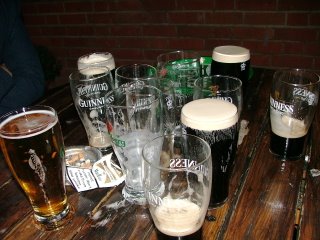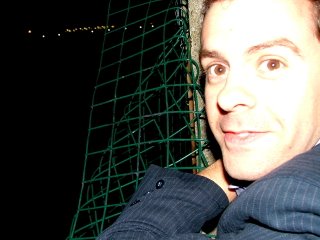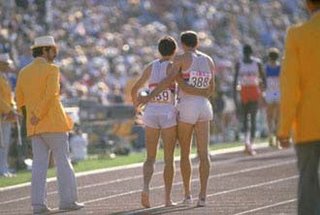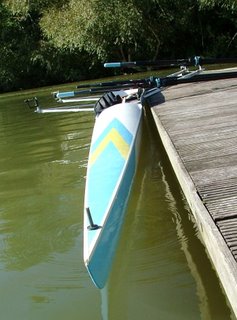
I feel duty bound to point out that I didn't drink all of that.
Having been told by the nice lady on the phone the previous evening that the track would be free from 6PM until 7:30PM, I arranged to meet Kev (who now has a blog all of his very own) and Gareth (who I think of as “enthusiastic”, but Kev very rudely refers to as “loud”) there shortly after six.
Much to our dismay, we were unable to run in the end as the track was covered in some sort of unmoveable, slightly smelly, and largely unsightly organic matter. I think it’s called “students”, but I can’t be sure.
Unfortunately, we had to go straight to the pub.
Needless to say, after a few beers, it seemed like a good idea to head back to the track and see if we could squeeze in a quick race before they closed. Sadly, we were a little too late and not quite drunk enough to avail ourselves of the hole in the fence. There was nothing else for it but to head back to the pub and consider doing the whole thing again next week.
Like some latter day Steve McQueen, Kev reckoned there was a bit of a blind spot.
The plan that was hatched may have been slightly alcohol-fuelled, given that it involved going back next week at exactly the same time. In the cold light of day, it occurred to me that we might encounter the same problems then that we dealt with so pathetically last night.
Another False Start
Posted by John McClure at 8:35 pm 4 comments
Athletics - 800m Preview

"That was lovely... fancy a Chinese?"
It would seem that the pace of the action around here isn’t quick enough for some people, so in an effort to keep things ticking over, tonight will see a bit of true Ultimate Olympian action – that is to say, some shambolic, poorly thought out, hurriedly executed sport followed by a trip to the pub with Kev from Sobell House.
On the spur of the moment, a gauntlet was thrown down, and tonight Kev and I go head to head over 800 metres at the Iffley Road track, the scene of Sir Roger Bannister’s most celebrated mile. The event was chosen because it’s short enough to not hurt too much (despite a complete lack of training), it’s short enough to not take too long (despite the new licencing laws, the pubs don’t stay open forever you know), and we don’t need any special equipment (like starting blocks).
Probably the most famous 800m race in the Olympics was the final in 1980, when Steve Ovett beat Seb Coe (pictured above pretending to like each other and wearing some particularly fetching gear). Coe had been the favourite to win the 800m and was gutted to only take silver – “There is only one medal that counts. I have to make sure it does not happen again.” – but a few days later, he faced Ovett again in the 1,500m (Ovett’s speciality) and destroyed him.
Tonight, I expect Kev - the Multiple Marathon Man – will be destroying me. I have two goals. The first is, as ever, to run the race in less than double the world record time. The current record is 1:41.11, set by Wilson Kipketer in 1997, so I’ll need to complete two laps of the track in less than 3:22.22. I think that’s possible. The second goal is to avoid getting lapped. I might struggle with that one.
Posted by John McClure at 11:49 am 0 comments
"You're gonna need a bigger boat..."

A few weeks ago, when I first met Tom and Nick from the Hinksey Sculling School, they warned me that sculling is addictive. They warned me that it was a hard thing to just try once and then cast aside. I’d be drawn to it, they said. I ought to be careful, they said. From the outside looking in, I admired their love of their sport, but I didn’t believe a word of it.
To me rowing (and sculling) was all about power. The bigger man wins. Yes, there is technique involved, but if you’ve trained harder and lifted more weights, you can make up for deficiencies in technique in a way that a technically gifted lightweight could never counteract.
On Saturday, for the first time, I got into a proper boat and headed out on the river. It didn’t take long before I realised how wrong my preconception about power was, and how right Tom and Nick were about the addictiveness of the sport.
The boat (pictured above) was a double scull. As I climbed down into it I felt the same disconcerting wobble of boat-on-water that I had previously felt climbing into a racing kayak in Nottingham last April.
Nick sat behind me in the front of the boat (if you can figure that out) and we pushed off. He explained how to keep the boat stable - hands in front, like Marcel Marceau climbing a ladder that isn’t there, left hand slightly above right - and demonstrated how the slightest lifting of either hand would make the boat tip to the opposite side.
Having established how not to fall in, and run through some light jargon (every sport has its own little language, littered with shibboleths to distinguish those in the know from those in the dark), we set off up the river.
I say we set off – really, Nick set off as I balanced the boat with my newfound blade (not oar) skills. A short dash down the river later, Nick decided he’d had enough of doing the hard bit and started talking me through how to scull.
What I did was very basic. The seat is on runners, but my legs were to remain locked straight throughout our session. At first, I wasn’t even moving from my hips, just using my arms, and the notion of flattening the blades on the way back wasn’t even entertained. Despite all that, there was a definite thrill involved in being the one powering the boat.
I learnt both my lessons (about power and addiction) almost simultaneously. I quickly realised that all the power in the world (and therefore, a lot of the time I’ve spent recently on the rowing machine or lifting weights) is entirely useless if you don’t know how to apply it. And I clearly didn’t have a clue.
Then, as I felt around with my blades, and splashed, and dug too deep, or missed the water altogether, suddenly, from nowhere, a perfect stroke. Both blades entered the water at the same time, dug just deep enough to get the maximum pull, without digging too deep and causing the boat to lean to one side, and then both blades exited the water together and ripped back, half an inch off the surface, ready to do it all again.
And I was hooked.
Most of my sporting understanding is filtered through golf. The same phenomenon exists there. A complete novice can lift a golf club, waft it around a bit, and if he or she is very unlucky, catch one absolutely flush and be addicted for life. The essence of the addiction is frustration. A glimpse of perfection is granted, but only for long enough to make you feel the need to search for it forever.
Rowing is a sport, like golf, where repetition is key. Above a certain level the difference between one person’s best and another person’s best is irrelevant. Instead, it becomes about who can reproduce their best most frequently, and (crucially) reproduce their best when it really matters.
Redgrave may not have been technically the best rower - or indeed the strongest, or the fittest - but he had in spades what others lacked. He had the ability to deliver his best at the critical moment.
It is the fact that you can sit in a boat for the very first time and produce (entirely by accident of course) something close to a Redgrave stroke that makes rowing addictive. I can watch Zidane with a football at his feet and admire the beauty of it, but can never know how it feels to do what he’s doing. I can watch Federer hit shots on a tennis court that make the hairs on the back of my neck stand on end, but I can only admire it, never experience it.
It goes without saying that I could never attain the Olympic heights scaled by Sir Steve, but at least I can taste it, just for a moment. I can’t decide yet if that taster is a wonderful thing or the dangerous early stages of a crippling addiction. This challenge is going to be hard enough to complete without having to spend time in rehab.
Posted by John McClure at 10:58 am 1 comments
Scull, scull, scull your boat...
Having spent last Saturday morning zipping up and down the river in a small skiff watching children as young as nine making sculling look incredibly easy, I’m heading back to the Hinksey Sculling School tomorrow to show them a thing or two about how to handle a long, thin boat.
I’m encouraged by how stable the youngsters looked in their single sculls, or at least I was encouraged until Tom (expert coach) pointed out that their centres of gravity are somewhat closer to the waterline than mine is going to be. One doesn’t so much sit in the boat as on it – or next to it in water up to my neck as will most likely be my innovative approach.
There will be no event completion tomorrow – we’re still at the stage of getting me into a boat to see how much work there is to be done before we can go to a proper racing lake to record some times – but I’m looking forward to it. Mostly.
One thing I’ve learnt so far in the course of trying Olympic events is that the more ardently the experts insist that their discipline is "easy to learn but difficult to master", the more likely I am to get either hurt, wet, or both. In April last year, Shaun Cavern, flatwater kayaking guru extraordinaire, kept telling me that his discipline was simple, right up to the point where I was disappearing into the Trent.
The next day, Ian Raspin, slalom kayaking guru extraordinaire, was saying exactly the same thing, even as he was saving me from drowning.
It’s slightly disappointing therefore that Tom Collins, sculling guru extraordinaire, has punctuated nearly every sentence he has spoken to me since we met with the expression "it’s really very easy." For now, I believe him - the kids last week certainly made it look so – but by lunchtime tomorrow, I might be singing a different tune.
Posted by John McClure at 12:30 pm 3 comments